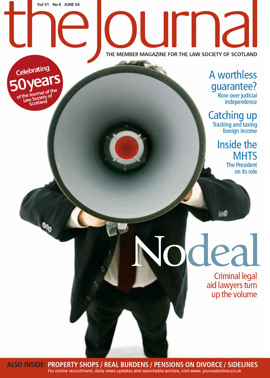HMRC to the rescue

There was a time when a few changes to a business’s accounting methods, all within the rules, could help reduce its tax bill. Now it seems changes imposed by accounting rule-setters are forcing tax bills up.
Even more curiously, it’s the taxman who is trying to mitigate the impact. The latest example is the revised Statement of Recommended Practice (SORP) for accounting for limited liability partnerships. It applies to periods ending on or after 31 March 2006.
LLPs: a convenient pretence
The new SORP brings accounting for LLPs into line with the modern distinction between debt and equity, so that any funding that is repayable is treated as debt. This means that under the new SORP, members’ interests in the LLP that would previously have been regarded as capital will now be classified as debt, unless the LLP has the right to withhold repayment (which is unlikely to be acceptable to many). Similarly, members’ profit shares could be treated as an expense in the profit and loss account instead of an appropriation of profit if they have an entitlement to shares of profit. In some cases, the new accounting treatment could lead to an LLP having no profit and no net assets.
A number of tax consequences could flow from these changes – not least a suggestion that partners ought perhaps to be classed as employees, so that PAYE and national insurance contributions would be due on their earnings. Fortunately, HM Revenue & Customs has confirmed that the general principle of treating an LLP in the same way as a partnership will continue despite these accounting changes. In other words, HMRC has agreed to pretend that the old accounting treatment still stands.
Work in progress: an ongoing concern
Individual LLP members should check that. Meanwhile, a lot of service businesses with a long tail of work in progress – from financial intermediaries to building and manufacturing subcontractors – might also want to check the tax consequences of how this is now to be accounted for under the infamous UITF 40.
In many cases, businesses must now treat as sales or fee income all work done in the current year even if the work is not completed and invoiced until after the year end. That could mean a one-off leap in turnover, profits – on paper, anyway – and consequently additional tax to pay.
When this issue first arose last year, the attention was on accountancy and law firms whose professional bodies, including the Law Society of Scotland, lobbied successfully for relief. It may therefore have passed a lot of other types of businesses by that the change affects them as well, and the impact could be just as severe – a one-off, perhaps crippling blow to cash flow to pay the extra tax.
The means to cope
Indeed, when the lawyers and accountants tried to show the Treasury they would not be the only ones hit, they found few other businesses had adequate work-in-progress records available to quantify the additional tax. They may still not have the processes or agreements in place to invoice more frequently and bring in the cash needed.
Again, the taxman has bent to help, allowing the extra tax to be spread over three years, and up to six for businesses severely hurt. The spreading relief (see Journal, May, 36) is not as generous as the 10 years’ spreading relief given when the cash basis ended for solicitors, and it appears that early adopters of the new accounting treatment do not get the full benefit of the spreading relief. But, as HMRC said, this time it couldn’t be blamed. The additional tax charge is all due to new accounting rules, the rationale for which is not always easy to see.
However, a lot of businesses are going to have to work through these new rules and deal with the increased tax charges which they may bring.
Isobel D’Inverno, Director, Corporate Tax, MacRoberts; Convener, Tax Law Committee
In this issue
- Independence first
- Stand up for our system
- The talking stops here
- The bill: a half measure
- Turning up the heat
- Strengthened or threatened?
- The patient approach
- Another little job
- The wars of the portals
- The LLP factor
- Avoiding surprises
- The temporary judge survives
- HMRC to the rescue
- Core of the agreement
- A debate to be resumed
- The impact of human rights
- Website reviews
- Book reviews
- Is that burden dead yet?






